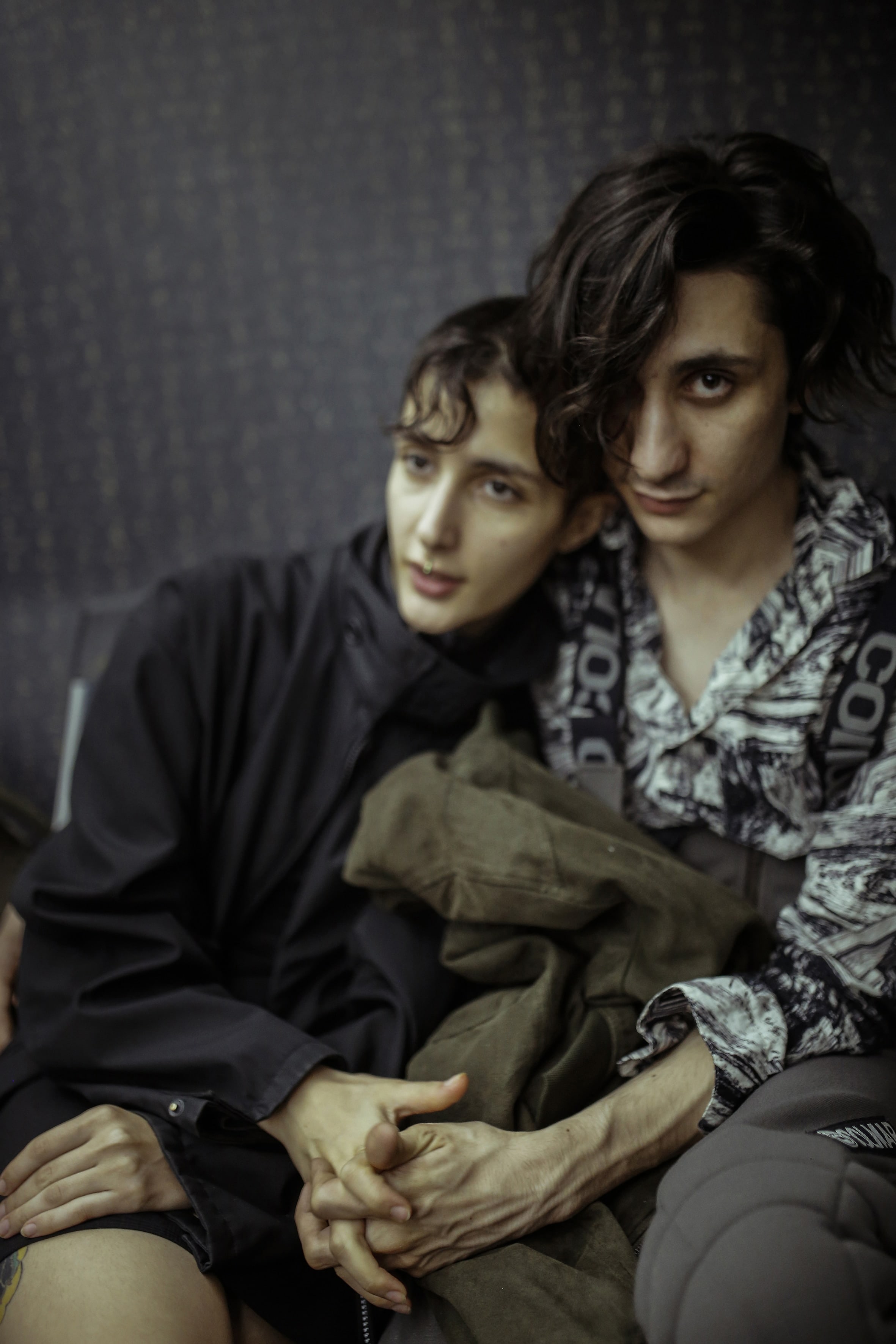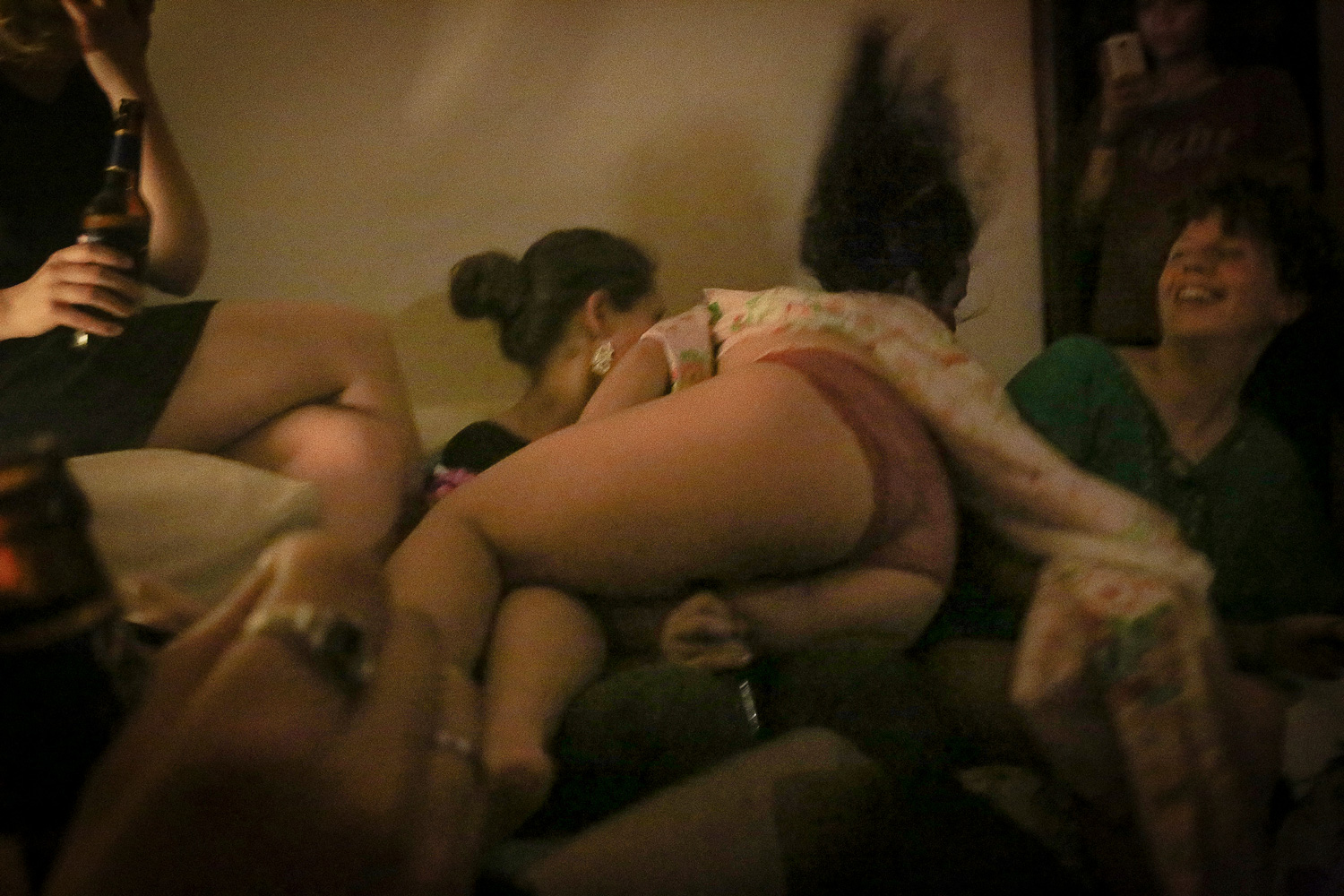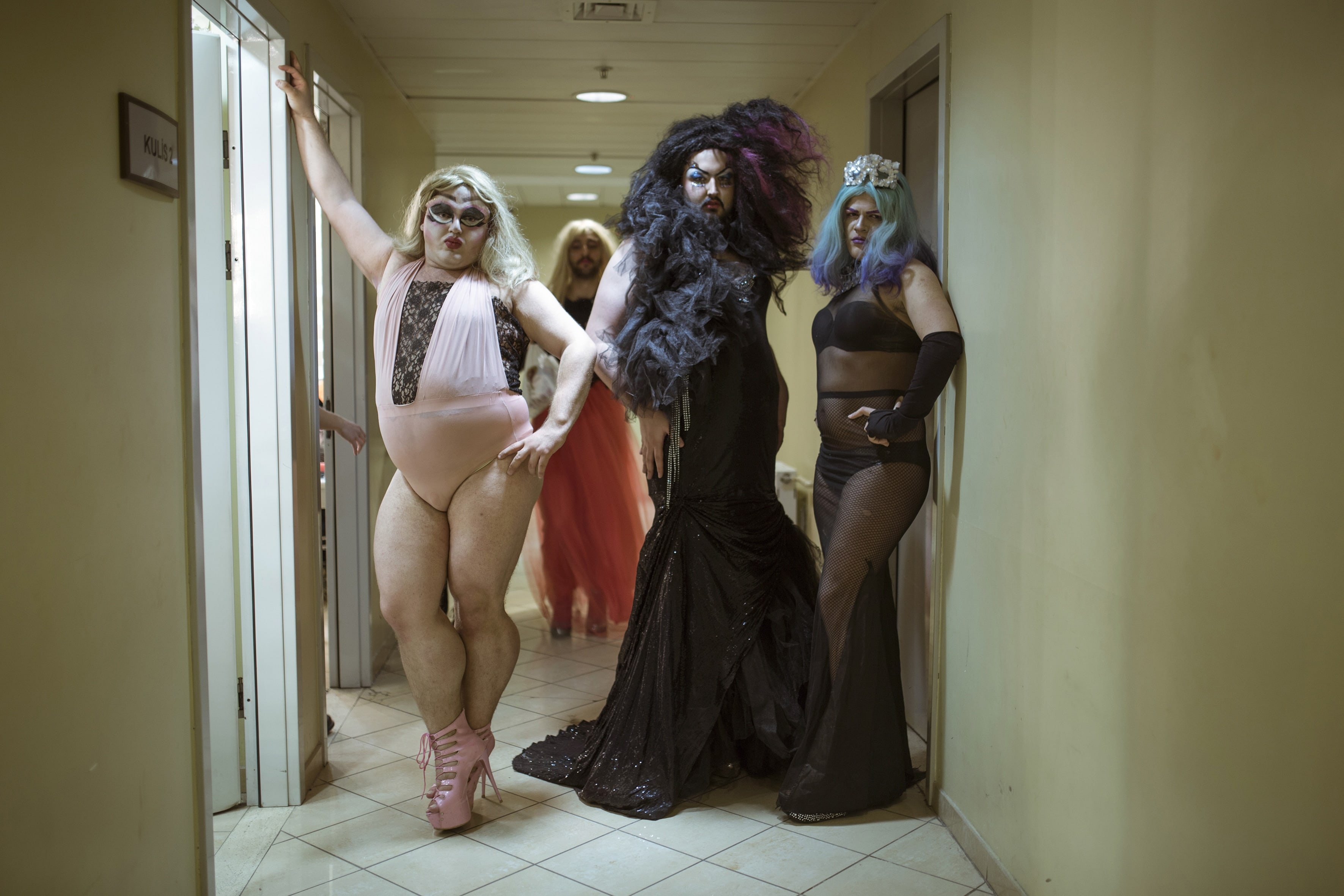12 April 2023
Inspired by the exhibition Istanbuls Today, Today's Stories series continues with Hande Ortaç's story "Felis"!
This series gathers short stories written by authors encouraged by the photographs in the exhibition.
Diary/Log No: 86
Status Report: Day 30
Officer: Anthropologist Hepat
Research Area/Date: İstanbul/2123
You will never hear from me again.
This is the last record I will deliver to you. There is nothing to fear. I have just decided to stay here. Completely on my own accord. I'm breaking all ties with you. Please do not come all this way to save me. I know you will be condescending, yet I will not hide from you that I am full of enthusiasm. From my hair to my nails, the tips of the fine hairs that cover my body and the lining of my stomach, my windpipe, the vein pulsating in my neck, the drop of my enriched blood…
Do not worry about me.
Since this is the last record, I'll do it right. Until now, I have narrated the events here from the perspective of an anthropologist, that is, within a scientific distance, let me admit, boringly. My experience here deserves a better explanation.
I will explain everything from the beginning.
Ever since we escaped Istanbul, floods, disasters, wars, and settled in the high lands up north, our family has been contemplating to return. But where? There is nothing left in the city but ruins, and a few memories faded from being told by word of mouth for generations in our minds. Along with these three famous photographs that my aunt brought as a gift from the excavation work she participated in 20 years ago in Istanbul. You know, those photographs that I based my thesis on, the ones that the scientific committee prevented from coming out on the grounds that "they could not have really happened, are fiction, would set a bad example for the current order", and which they have dragged on for the last two years by not sending me to do research in the region.

One could tell from the notes on the backs of the photographs that they were taken from 2015 to 2022. Images of people clinging to life, connecting with each other and having an appetite for life, very different from the artificial union we have established today under the name of a 'New Society'. I was smitten when I first saw it. I was only five or six years old then and growing up in the hands of a nation that was horrified by the catastrophes it created using its own hands, ashamed of the breath it took, that made rules after rules depriving one of the will to live, in the name of nothing but maintaining the human race. Dreaming of an alternative life could portray the biggest betrayal. Thanks to these photos, I dared to dream. With this found courage, I prepared my thesis on this community, whom I assumed lived a century ago. Our society, built on a sharp gender binary, is based on controlled reproduction. In saying we respect each other, we in fact distance ourselves from one another and build individual walls around us. I was dreaming of an alternative life in my tiny office, but couldn't prove that it had actually happened. This construct brought me a strange addiction. I knew that this was not healthy at all. I had to finish the thesis as soon as possible to work on new projects. Apart from these three photographs, I did not have any concrete data. I had to make my way to the area. Once I reached Istanbul, I was sure I would find more evidence in this ancient city, which was mostly submerged in water and almost totally ruined by the three major earthquakes that happened within a century. Maybe some garbage remains left in a few bags, pieces from that period even if they were caught in the rain and buried in mud, a diary forgotten in a drawer half swollen with water, a few more photographs, maybe a record in the archives that was still not wet but now resembles a mouse nest. Clothes, graffiti that belong to that community… I don't know.
I desperately needed the imagination of a possibility other than the society which I lived in. We try to survive by wearing uniform clothing as they are resistant to ultraviolet rays and avoids the sun. We are so afraid of everything that we can only feed on fish. I used to daydream in that tiny room. Let alone jumping up to bless the existence of another person, bowing on the knee, reminding them in each sentence that I obeyed the norms of society… I wouldn't even feel if someone else entered the room. The melancholy I fell into in a community where respect and interdependence was unacceptable and rule-breaking behavior. So they called me a rebel and were convinced that I needed to get away for a while. It was a task given to me to be able to realize that death would confront me upon stepping out of the new order and to remember the sanctity of staying alive.
From the day I arrived in Istanbul, I knew that I was not mistaken, that the society I had dreamed of did actually exist once. Despite its run-down state, the city had managed to impress me. Although when I saw that the descendants of the people in the photos were still alive, I wet myself in fear. Without reflecting my shock to you, I continued working and sharing my reports in case you ever called me back.
You know, they saw me as an enemy who had come to destroy their order in the first place, and later as an insidious agent threatening to disturb peace when they noticed the absence of my military virtues. I had a hard time communicating with them for a long time. Reproducing and growing only amongst themselves, they use a slang that differs from the proper Turkish we learned at school. Despite our own over-respectful and fragile communication, they are very rude to one another. They say that this is also natural and that it seems strange to me since I am not used to it. They find me artificial. I got used to their way of communicating, and am not offended anymore, but at first I wanted to go back to my good days when I simply fantasized in my office. The community claims they have been here since the territories were evacuated. They lived in caves in the inner parts of the Istanbul Northern Forests for a long time, the details of which I previously shared in Diary/Log No: 28. When disasters broke out one after another, they acted together to survive without breaking their unity. It was not hard for them to do so.In the past, the ancestors of that community were also in strong solidarity to survive. They say, "What binds us is not our blood ties, but the determination to live as we feel." Encouraged by the alleviating climatic conditions for the last ten years, they settled further south, in the inner parts of Fatih district, at the back of the Historic Peninsula. They settled in a thirty-six-story building here. This building, built in 2025, survived three very severe earthquakes without any damage. Before having the chance to examine the construction technology of the building, which was built to set an example for others with the superior Japanese technology of the time, the city was destroyed by the first major Istanbul earthquake of the century. Then, other natural disasters exploded one after the other, and they could not find an opportunity to construct new buildings. Nowadays, right in the middle of the city walls, adjacent to many historical structures like old palaces, mosques, baths, bazaars, synagogues and churches that have survived, a city is being established in this building. Leaving out the element of solidarity within the community, I have detailed the order of the building in Diary/Log No: 32. The reason why my aunt didn't notice the community here at the time is that they were still hiding deep in the Northern Forests when she was working. I had forwarded the cave graffiti of that period on File No:6.
It was the tenth day. I was looking at the shattered ruins of the city through the wide windows of the refectory on the twenty-eighth floor of the building. From where I was standing, the Sea of Marmara and beyond it, Kadıköy were visible, and I could see the Bosphorus looking towards the left. Üsküdar on the other side of the Bosphorus and the still-intact legs of the Bosphorus Bridge in the middle of the sea were also within sight. There was no more of the asphalt bridge connecting the two sides. The waters had receded considerably compared to records from twenty years ago, but Üsküdar Square was still under water. I did not understand the language. People didn't want me. They are different people. They are trying to connect with the future, not the past. I'm the complete opposite. I couldn't relate to any of them because of my mismatch. I was deeply disappointed. While I was resting my head on the thick glass and thinking about what it would be like to fall down, Pars approached me. He told me that the source of my despair was my blood, which was starting to poison. I didn't understand. They wouldn't leave me to die.
I couldn't believe it. They would help me if I wanted. I just had to pretend to be one of them for six hours. I would have a hard time, but I would be able to do it. I didn't realize I was on the brink of life and death. I nodded my head and said "ok".

I did not report the ritual to you. Because participating in this ritual meant that I lost my scientific distance. Instead of looking and observing, I chose to go inside and living it through. This personal experience was going to lead me to make emotional decisions. Even if I hadn’t participated in this ritual, I would still have to pack my things and return as soon as possible. The medicine given to me was not enough to eliminate the negative effects of the climate here. My curiosity overcame my work ethic. I lied selfishly.
Every ten days, people here enrich their blood in order to purify it from the acid rain, asbestos that continues to be released from debris, ancient microbes emerging from melting poles that spread all over the world through the oceans, from new generation viruses as well as to replenish the sparse amount of oxygen. Actually, what they do is inject a serum cocktail, the content of which they have developed many years ago, directly into the body. This very strong cocktail causes an uncontrolled elevation in the body that continues for six hours. In present-day terms, it makes you high; in the words of this place, it makes you fly. The entire community is divided into three groups. Each group takes turns getting the cocktails, and the other two groups keep an eye on the one that is high.It's not like they're blocking or imprisoning, but rather keeping the group under control so they don't hurt themselves. A coercive style is not possible, because they are all aware of how annoying the interventions are while under the influence of the cocktail. In order to be a family, you have to choose someone. To give birth or to be born is definitely not enough while such circumstances do not create dependence. The concepts of femininity or masculinity are long forgotten. Desiring, loving or wanting is the basic motto of the society. A group of at least three people or usually more who choose each other live together during non-ritual times. It is also possible to be alone or in a couple. Completing three is only encouraged. When it's time for the ritual, family members separate into different groups so they can keep an eye on the person receiving the serum. Those getting high in the same group freely make love to each other, talk, have fun or cry. Other family members check from a distance to see if the tension turns into a fight or desire turns into violence. There is no jealousy, where the concept of belonging is based on completely different values. My observers were Lynx and Oselo. They had recently lost the third member of their family. They volunteered to keep an eye on me.
I remember going to Borneo right after receiving the serum and questioning them. “What strange names are these!”. "Hey Lion, I'm here, come and grab me," I haunted Aslan. “These are not names used in Turkish. What are you making up?" I burst out laughing. I think. It could also be a subtle scream coming out of my mouth. I kissed Caracal, whom I hadn't been able to take my eyes off of for a while and stripped naked in front of them. I bent my knee respectfully, as you do every time you meet someone. Caracal joined in laughing. We swam in the Golden Horn together. Then we made love on the beach. “Our nickname is plagiarized from the feline,” they whispered into my ear, “they are the cats of Istanbul.” “But these cat breeds you mentioned don't live here,” I insisted. There was a full moon in the sky, and their nipples glowed in the bright light. “Thank you, you have the right to rebel, this is not their home, but they are the offspring of the same family as us. Of the felines!” They gave me a kiss on the cheek and started walking towards Aslan. I admired their hips moving left and right.

Following that ecstatic evening, I felt like a part of this society. They allowed me to act as I felt, and did not condemn me. My overly polite attitude during the day bothers them, I feel it. Yet, they include me in the agricultural activities within the city walls and bird hunting on the Golden Horn. I know more about fish than they do. Although the bluefish or bonito immigrating from the Black Sea into the Bosphorus presently carry poison, we can safely collect and eat the thick crustaceans at the bottom of the rocks. I thought I wouldn’t be able to get used to it. In order to not lose my chance to return, I tried conveying what was going on here scientifically using these records. The logs I sent earlier contain valid information. Please don't destroy them. For future generations.
I decided to call myself Felis. The stray cat, you know. I'm the kind that finds the nest that she's screwed around. I will be attending my third ritual here tonight. We get on very well with Lynx and Oselo. Oselo said it was time to make a baby. We will take care of the baby together. They think that there may be communities still surviving in places of high altitude in the interior regions of Anatolia, but they did not dare to move as they didn’t have vehicles. They hesitated because they did not know the dangers the long-untouched lands held. My vehicle will help them with this. An old saying goes, "Give your blessings with regards to the vehicle." In one of the folk tales I read as a child, it was told that many lives were saved during the war in an inn that was said to belong to Pembe and Eflatun and thought to be near Kocaeli. Maybe a life has sprouted in that vicinity and that there are still those who are alive. Who knows? We'll soon be on our way to explore.
I'm ending the recording. Say hi to my aunt for me. I no longer want to live a life filled with nostalgia for the past, but with curiosity for the future. I am grateful to her for bringing me here and sharing with me the three photos she found in a wreck.
Felis
Hande Ortaç completed her undergraduate studies at Boğaziçi University, Department of Political Science and International Relations, and her master's degree at Bilgi University, Department of Organizational Psychology. Her short story Kankurutan (Mandrake) was awarded the first prize in the altBook 2008 Short Story Award, and her short story Pembe and Eflatun (Pink and Violet) in the KaosGL 2020 Woman to Woman Story Competition. She has three short story collections: Kankurutan (Mandrake, Ayizi Yayınları, 2011), Üç İki Bir Kayıt (Three Two One Action, Ayizi Yayınları, 2015), Daha İyi Misin? (Are You Better?, İletişim Yayınları, 2021). Ortaç also contributed to 90lar Kitabı Çocuk mu Genç mi? (90s Book Child or Young? prepared by Kadir Aydemir, Yitik Ülke Yayınları, 2012) and O Yaz (That Summer, altKitap, 2013) with her texts.
Photographs:
Cansu Yıldıran
From the series Shelter, 2015-2022
Tuesday - Saturday 10:00 - 19:00
Friday 10:00 - 22:00
Sunday 12:00 - 18:00
The museum is closed on Mondays.
On Wednesdays, the students can
visit the museum free of admission.
Full ticket: 300 TL
Discounted: 150 TL
Groups: 200 TL (minimum 10 people)